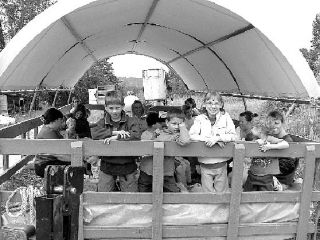Erick Haakenson, owner of Jubilee Biodynamic Farm in Carnation, will speak about the value of Community Supported Agriculture (CSA) programs like his at the North Bend Library this Thursday evening, May 22.
He described CSA as a relationship between a farmer who grows organic produce, and local members of the public who want to support that farmer’s agricultural efforts, and enjoy fresh fruits and vegetables. A week’s supply of CSA produce costs around $30, he said – less than buying organic foods from a grocery store.
“Members get good, fresh vegetables, and the additional benefit of the relationship with us, the people who raise their food, and the confidence that we’re raising it by organic standards. They also have the chance to interact with the land,” Haakenson said.
His farm, the first CSA in the Valley but now one of several, gives members the option to pick their own produce.
“Families show up; kids show up. A lot of times they make a full day out of it, and it ends up being a really good family and community activity,” he said.
He and his wife, Wendy, lead a weekly “farm school” for children. At a recent session, all the young farmers-in-training wanted to pull out onions. Knowing that many youngsters don’t eat onions, Haakenson wanted a guarantee that his produce wouldn’t go to waste.
“So I made them put their hands up in the air and say an oath: ‘I promise that if I take an onion, I will eat it at home tonight.’ And their moms said they did!” Haakenson said.
The Haakensons also find joy in teaching new adult members with little cooking experience how to steer their diets away from processed foods.
“We try to take people like that and show them how to use something like Swiss chard. It’s a big old bunch of greens. You look at that and go, ‘What do I do with that?’
“But when you come to learn how to do something with that, you recognize that it’s very tasty when prepared correctly, and it is so high in nutrients, so good for you, so strengthening of the body. It becomes a staple of the diet – something you would eat regularly.”
Using the Internet, it’s easy to find recipes to use just about any food. The trick for many is figuring out what Swiss chard is.
“Most people just need for us to identify them. They don’t know what a turnip is, or rutabaga. So it’s learning to eat with some vegetables that they haven’t before.”
Many of Haakenson’s 450 CSA members have found that eating organic, locally grown foods improved their health.
Haakenson said it’s far healthier than “processed foods that have been eviscerated of nutritional value.” And it’s even better than “conventional (non-organic) foods that are given just enough nutrients so that they look good, but not given trace minerals like most organic farms do. Trace minerals are where the action is.”
Haakenson said he’s suffered just one cold in eight years, and attributes his health to knowing what’s going into his food.
Jubilee Farm is transitioning beyond organic into biodynamic, which calls for the farm to be a closed entity that creates its own feed and fertilizer.
“Biodynamic is the only real sustainable farming that I’ve ever heard of, and it’s an incredibly high standard,” he said.
Most farms, even organic ones, ship in fertilizer from the outside. But Haakenson sees that practice as robbing fertility from other lands.
“The United States brings in a lot of fertilizer from Peru. Well, what about the people in Peru? Don’t they have a right to use their fertility?” he said.
Instead of importing fertility, Jubilee creates its own through a complex system of raising animals and composting their manure.
“With conventional farming, you don’t really have to think about what you’re doing, because you have chemicals to do everything. But once you get rid of those chemicals, it’s a whole new world, and you have to really think about what you’re doing and craft ways to work with nature, as opposed to just dominating nature. It really does open the door to careful observation and cooperative work,” Haakenson said.
As challenging as it is to create a biodynamic farm, Haakenson’s philosophy, adopted from Rudolf Steiner’s writing on biodynamic farming, wouldn’t allow him to do it any other way.
“I think of the farm as kind of like a living presence. I do really believe that treating the soil and the earth with respect as if it is a being with rights of its own — it keeps you from doing abominable things, like pouring pesticides and herbicides. In the organic business, there’s a rule: You can’t use herbicides. But in biodynamic farming, you think, Would you do that to a living presence?”
• More information on local farms and CSAs is available online at www.pugetsoundfresh.org.


